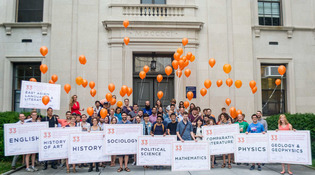 loading
loading
Light & VerityTeaching assistants file petitions to unionizeAn NLRB decision gives TAs the right to organize.  Local 33/Unite HereGraduate teaching assistants posed in front of Woodbridge Hall after filing petitions for union elections with the National Labor Relations Board. View full imageThe 25-year campaign to unionize Yale graduate teaching assistants gained new life in August, when the National Labor Relations Board (NLRB) ruled that teaching assistants at private universities are employees with the right to organize. Local 33, a group of Yale TAs, promptly filed petitions with the NLRB, asking for elections that they hope would certify Local 33 as a union. (Local 33 was formerly known as the Graduate Employees and Students Organization. Like Yale’s clerical and technical union and its service and maintenance union, it is affiliated with the national union UNITE HERE.) Local 33 is requesting separate elections in each of nine departments in order to create nine separate bargaining units. (There were originally ten departments, but Local 33 withdrew the petition for the comparative literature department.) The university administration is challenging the petitions, arguing that the approach is “insufficiently democratic,” as Graduate School dean Lynn Cooley wrote in an e-mail to graduate students and faculty. Such an approach is unprecedented in higher education; usually, bargaining units include most or all teaching assistants regardless of department. But in other contexts, the NLRB has looked favorably on efforts to organize by “microunits,” says William A. Herbert, executive director of the National Center for the Study of Collective Bargaining in Higher Education and the Professions, a labor-management research center at Hunter College. In 2011, the NLRB permitted employees of a nursing home to organize in certain departments rather than the entire facility, establishing an often-cited precedent. Herbert says that when a bargaining unit includes an identifiable group of employees that “has a shared community of interest, the burden of evidence turns to the employer to establish that there is an overwhelming community of interest with additional employees, warranting their inclusion in the same bargaining unit.” Beyond this question of process, Yale argues that a union is unnecessary, noting that graduate students pay no tuition, receive stipends to cover their living expenses and health insurance, and teach for no more than 14 percent of their time at Yale. Further, in an e-mail to the Yale community, President Peter Salovey ’86PhD expressed his concern that the teacher-student relationship “would become less productive and rewarding under a formal collective bargaining regime, in which professors would be ‘supervisors’ of their graduate student ‘employees.’” Local 33 cochairs Aaron Greenberg ’18PhD and Robin Canavan ’18PhD cite several reasons they want a union: to establish a more effective grievance process for harassment cases, to negotiate better coverage for mental health and child care support, and to guarantee “transparency and security” in teaching loads. “We want to negotiate with the central administration for pay and benefits,” says Greenberg. “TAs at public universities have done that for 30 or 40 years, and it doesn’t seem like faculty-student mentor relationships have broken down as a result.” Graduate students are divided over the union proposal. The Graduate Student Assembly voted in October to oppose Local 33’s specific organizing efforts, but also voted to remain neutral over the broader question of unionization. A student group called GASO was recently revived to oppose Local 33’s efforts; cofounder Elizabeth Mo ’18PhD says graduate students “have endured harassment by GESO organizers. They show up at their offices, labs, and homes, and they don’t take no for an answer.” In hearings in Hartford in October, the NLRB’s regional director heard testimony from Yale officials and union organizers about the petitions. A decision was expected some time after the end of October.
|
|
1 comment
-

Merja H Lehtinen, 6:34pm November 11 2016 |  Flag as inappropriate
Flag as inappropriate
The comment period has expired.Many students even brilliant scholars are clueless regarding fair labor practices. If we fail to teach and model best practices at universities, who will?